August 4, 2025 | Paul Stimpson
A competition for people with Parkinson’s in Manchester has taken on an international element with three Japanese players travelling to take part.
Their presence at the ParkySMASH! Event is a reciprocal visit after a delegation of English players with Parkinson’s went to Japan earlier this year.
ParkySMASH! is at the Great Northern Ping Hub in Manchester on Sunday 7 September, and spaces are still available.
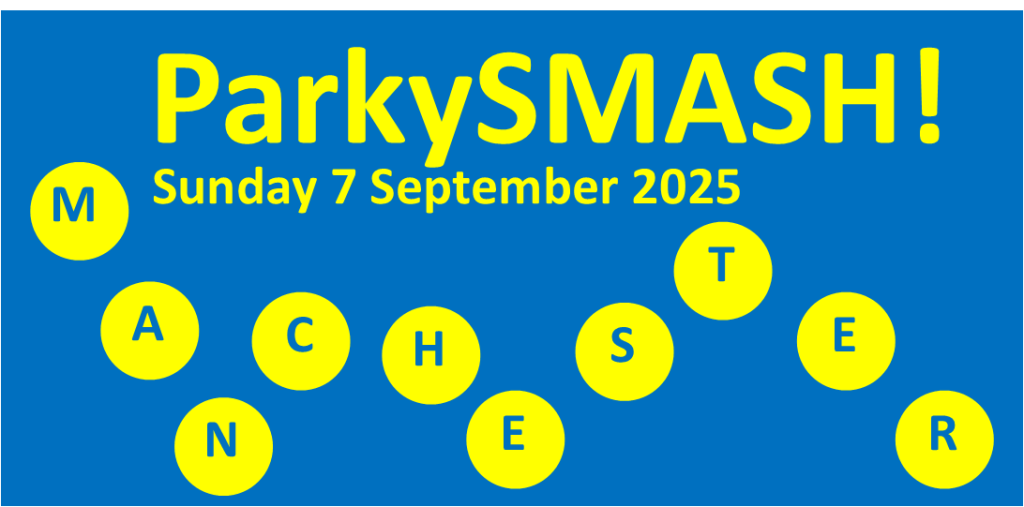
It is a day of table tennis for anyone living with Parkinson’s, whether you already play and would like to take part in a friendly tournament, or you would like to try table tennis outside of competing.
Click here to book a place by Friday 29 August.
The ParkySMASH! tournament is open to 30 players, with more spaces available for those who just want to try table tennis. There are at least 12 places for women, and at least 12 for men and if there are enough people the tournament will include women’s singles, men’s singles, and open doubles.
If you would like to play in the doubles, you will be paired with somebody on the day. Taking part in ParkySMASH! is free!
ParkyPING! in the land of the rising sun
The three Japanese table tennis players, each with Parkinson’s, are visiting as part of Japan Week Manchester but it is also a reciprocal visit after club players from Manchester and Yorkshire visited Japan to share experience about table tennis groups for people with Parkinson’s.
Below, ParkyPING! co-founder Rob Cook from Leeds tells the story of the trip.
When I received an invitation to be part of a delegation to Japan, it’s fair to say that I was gobsmacked! Living with Parkinson’s, I knew that such a trip might be stressful and exhausting, but there was no way I was going to turn down such an exciting opportunity. George Chan, of Harrogate, who was also invited, had a similar reaction.
Playing table tennis is recognised as one of the best ways for people with Parkinson’s to slow down the progress of the condition. George and I have both set up groups, in Harrogate and Leeds respectively, for people living with Parkinson’s.
We had also each played with Japanese doubles partners in international championships: George with Hiromichi Kawai (Hiro) at last year’s Scottish International Open, and me with Mayumi Kanie at the PingPongParkinson’s World Championships in 2022, 23 and 24.
The trip was organised at our end by Harry Au, who wants to make his club – Altrincham Table Tennis Social Group – open to people with Parkinson’s, and club coach Peggy Poon. The trip was funded by The Great Britain Sasakawa Foundation.
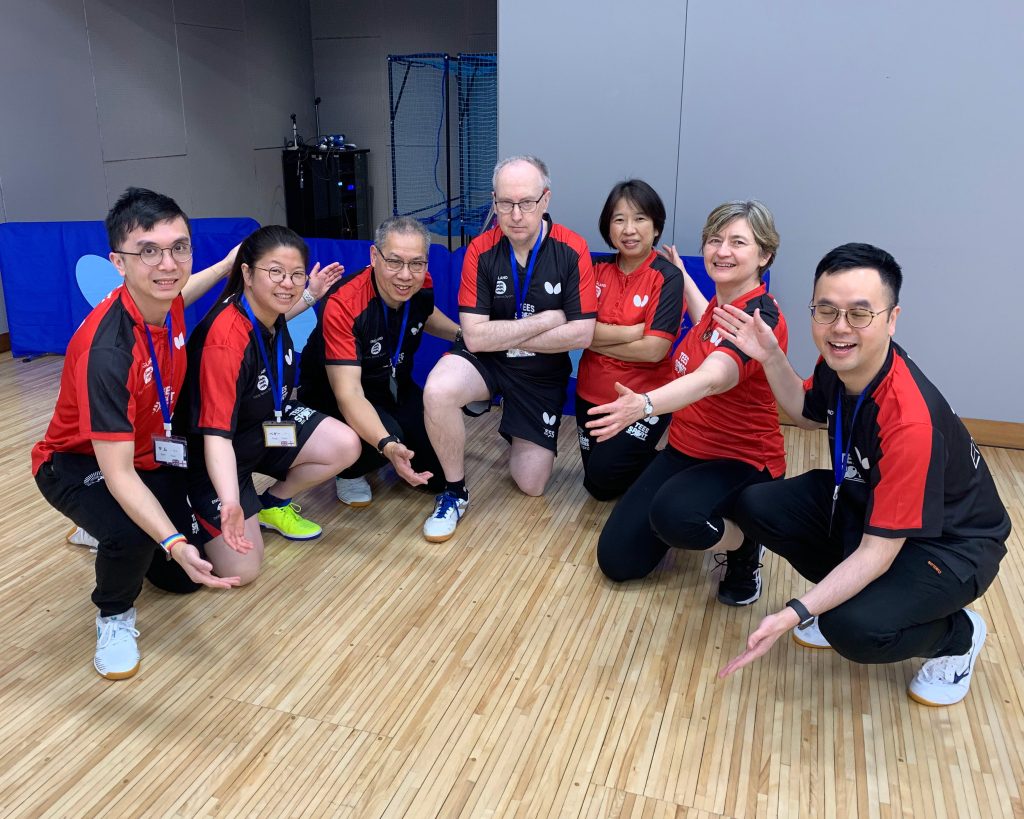 From left: Sam Kam, Peggy Poon, George Chan, Rob Cook, Mayumi Kanie (PingPongParkinson-Japan), Kerry Courtney, Harry Au
From left: Sam Kam, Peggy Poon, George Chan, Rob Cook, Mayumi Kanie (PingPongParkinson-Japan), Kerry Courtney, Harry Au
George and I, like so many people with Parkinson’s, often deal with severe anxiety. The short notice, the urgent need to book our own flights and accommodation and the uncertain itinerary, pushed hard on those buttons. Both of us got through that period with the support of our partners, Janine and Kerry respectively, who were also coming to Japan self-funded, with Peggy’s partner Sam travelling on the same basis.
It was a very long time since I’d done a long-haul flight, and I didn’t know how the Parkinson’s model of myself would cope, especially if I got the dreadful Restless Legs Syndrome (one of the 40+ off the shelf symptoms available to people with Parkinson’s). Despite not sleeping (that’s another one!) I survived the journey more or less intact.
Kerry and I headed straight to Nagoya, a major city about 230 miles west of Tokyo. We were looking forward to relaxing on the famous Shinkansen (bullet train), for which we’d booked seats and luggage space.
We congratulated ourselves on getting from Haneda airport to the right train station, where we were made to feel at home: hordes of people were standing around staring at departure boards, which told of massive delays due to record-breaking snow (presumably of the wrong kind!). Facing a blizzard of uncertainty, we squeezed on the first possible train, standing in the aisle with our luggage all the way to Nagoya, which made us barely able to get the promised, iconic view of Mount Fuji.
The next morning, we met up with my mixed doubles partner, our friend Mayumi. She had organised a Parkinson’s table tennis session in neighbouring Ichinomiya, combining the two groups she is involved with. There were about 25 people, all of whom wanted to play me and Kerry!
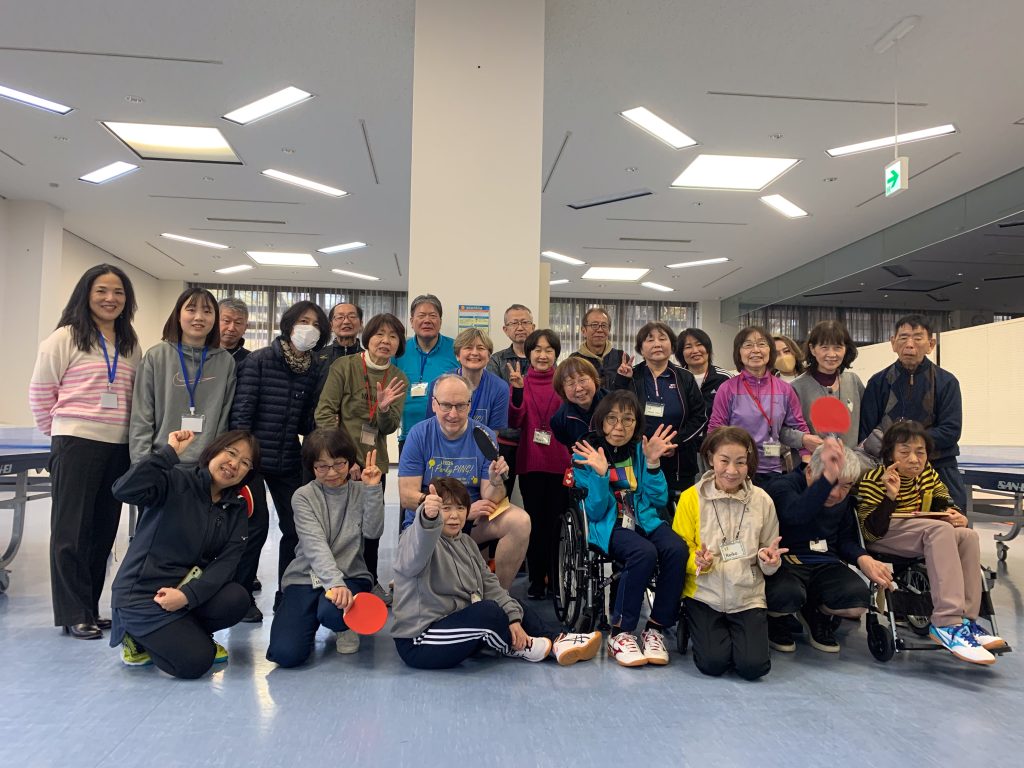 The visit to Ichinomiya
The visit to Ichinomiya
After a well-organised series of rotations we took part in a related bingo session, a quiz, and I did a Q&A. Despite the obvious cultural differences, it all felt very familiar: greatly mixed ability, mixed levels of Parkinson’s, and nobody panicked when a couple of people fell over while playing. I loved it.
We were very grateful to Kanie-san for organising it, including use of microphones, and a brilliant volunteer interpreter. It was outside the official programme and really added value to the trip. We left clutching beautifully wrapped boxes of biscuits, gifts from individual members of the groups.
The next day we took a more comfortable Shinkansen to the ancient capital, Kyoto, where Hiromi Ando (another member of the Japanese team), lives. We don’t know Hiromi well, but she and her husband spent the day taking us to various fascinating temples and historic neighbourhoods.
Once settled into our hotel back in Tokyo we met up as a whole group for the first time, at the Tokyo Metropolitan Gymnasium (table tennis venue for the Tokyo Olympics). There we met Izuku-san, organiser of Japan Week, which is held annually somewhere in the world. In September it will be held in Manchester, the first time in the UK for about 20 years.
Harry was keen for table tennis to be featured during the week, particularly in relation to Parkinson’s. Although the time with Izuku-san was not as long as planned, the response was very positive. We also had a briefing from Harry on what would happen in the next three days.
We spent a day visiting a series of projects in Fujisawa (a small city about 50km south-west of Tokyo). It was a very early start, which necessitated Kerry and I being at the 25th floor breakfast room as it opened at 6.30!
The day was led by Koji Nagabuchi, Chair of the Japanese Table Tennis Therapy Association. We visited a Senior Citizens Salon, Music of Mind (a cafe staffed by people with learning disabilities) and Ping Pong Day Happy Shibuya.
We were so warmly greeted everywhere and applauded when George and I were introduced as medal winners at PingPongParkinson World Championships. Among other things, we took part in a game of ‘Handbell Table Tennis Volleyball’, designed for visually impaired people. Sat around a table tennis table, a team on each side, we used handbells to flick a ball, filled with things that made it rattle, underneath a raised net. The objective was to breach the opposition’s defence. While not exactly table tennis, it was great fun!
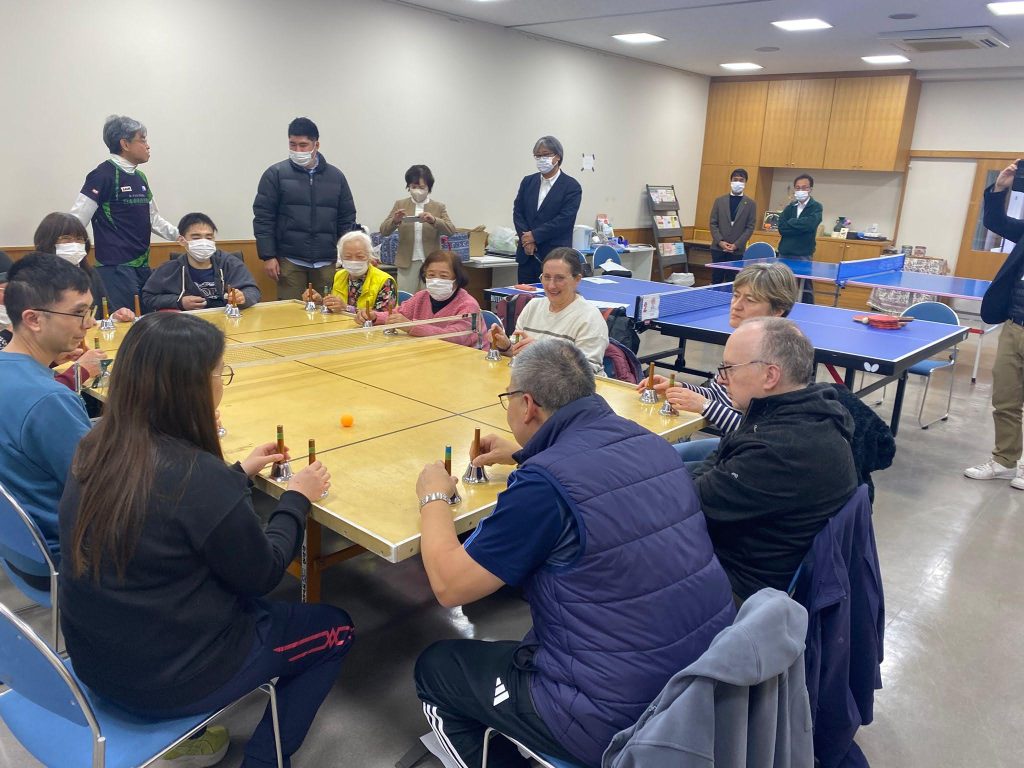 Playing handbell TT
Playing handbell TT
There was also table tennis, as we know it, with people who use the services, and staff and volunteers, as well as table tennis with a variety of unusual bats, including a frying pan, a piece of bamboo, a long tin with rubbers on the outside, which you put your arm right into, and we played or watched people playing with two balls simultaneously, and two bats each.
Players included a highly competitive woman aged 92, and a volunteer coach with Parkinson’s. It was all very innovative, inspiring work.
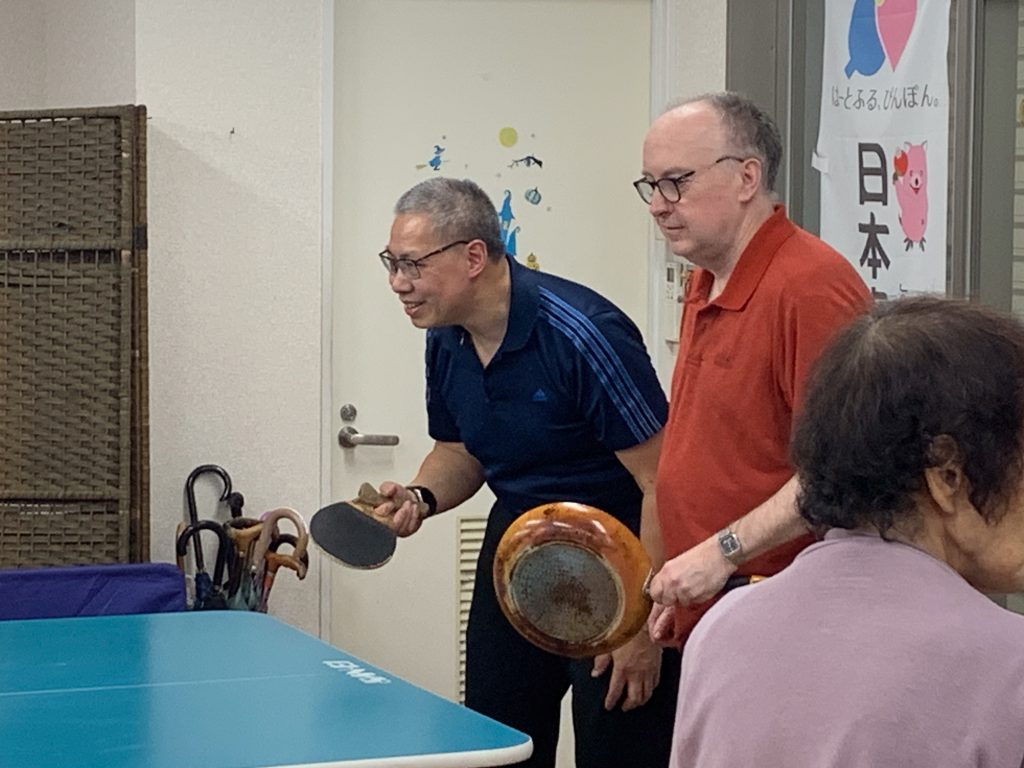 At Ping Pong Day Happy Shibuya
At Ping Pong Day Happy Shibuya
Music as therapy was also on the agenda, as a therapeutic and social tool.
In Tokyo we had one day being tourists, when Mayumi rejoined us from Nagoya. We spent a long time in a table tennis shop. There was a table where you could try out rubbers and blades, and long rows of what looked like racks and racks of vinyl records! But look again, and we realised that they were rubbers!
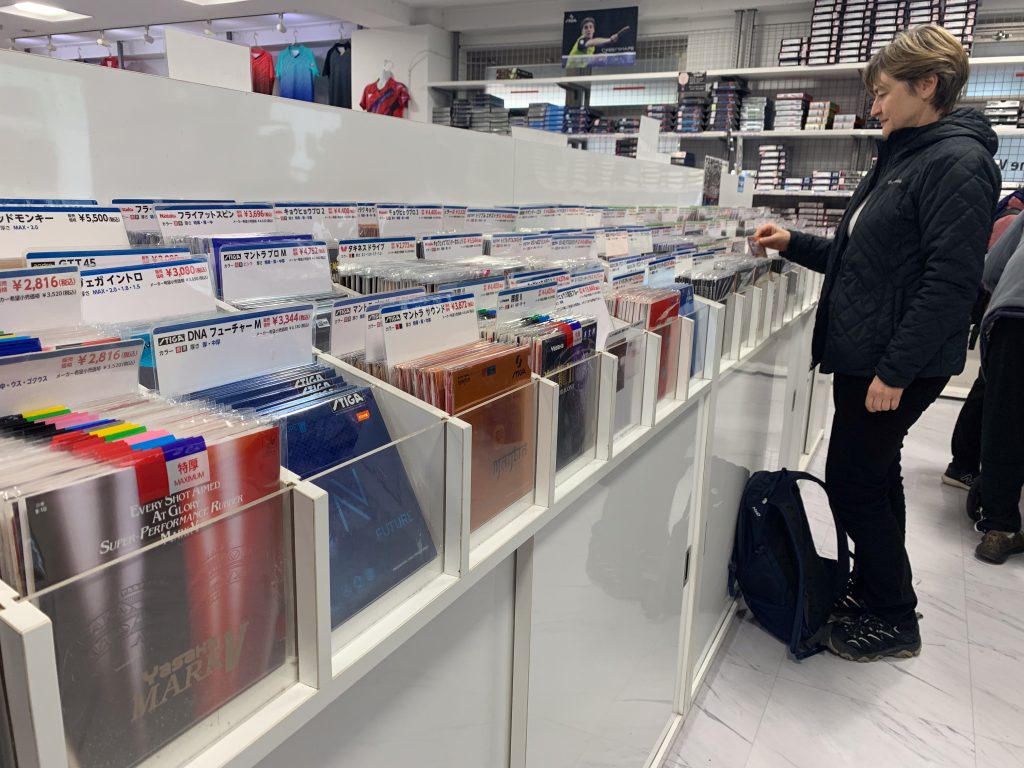 In the table tennis shop in Tokyo
In the table tennis shop in Tokyo
The final day of our trip looked exciting – and complicated! We were due to play in an ‘England v Japan match’ in the basement of the global HQ of Butterfly, then get to the airport on the other side of Tokyo, via a karaoke session. Would we have time to shower, to change, before boarding a flight? Would we be forced to sing?
It was a fantastic venue for table tennis, with a beautiful wooden floor, great lighting and a high ceiling. Our extremely diverse ‘England’ team played matches, including singles and doubles, against three different Japan teams, made up of people with Parkinson’s.
Rather surprisingly, we won all our matches, and our hosts were very positive about our table tennis. We observed that Japanese players always check each other’s bats before playing. (Players at my level in Leeds, don’t do this). And they always decide who serves with a quick ‘stone, paper, scissors’! The event finished with speeches and an exchange of gifts.
We weren’t forced to do karaoke, but Kerry and I took the opportunity to take part in the local cultural feature. It felt the right thing to do to finish the trip.
We had a fantastic, fascinating time in Japan, with great food and sights. But what made it for me was spending time with Japanese people, particularly playing table tennis. In my club life in Leeds, most people who haven’t met before will only start talking to each other after playing. It was exactly the same in Japan.
Our wonderful sport is such a good tool, and universal introductory language, for breaking down national and social barriers.
Many thanks to: Harry and Peggy of Altrincham Table Tennis Social Group for organising at the UK end; Kawai-san, Kanie-san and Nagabuchi-san for organising events in Japan; Table Tennis England for providing kit, and badges and pens for gifts, and The Great Britain Sasakawa Foundation for funding the trip.


AloJapan.com